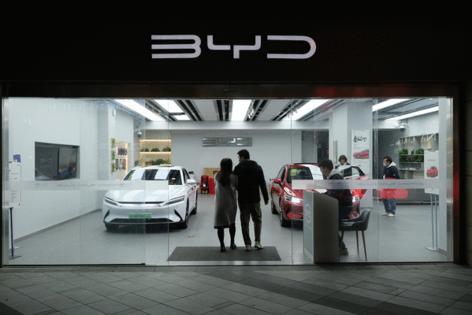China urges EV makers to buy local chips as US clash deepens
Published in Automotive News
The Chinese government has quietly asked electric-vehicle makers from BYD Co. to Geely Automobile Holdings Ltd. to sharply increase their purchases from local auto chipmakers, part of a campaign to reduce reliance on Western imports and boost China’s domestic semiconductor industry.
The Ministry of Industry and Information Technology asked carmakers this year to expand their buying of homegrown components to accelerate the adoption of Chinese chips, according to people familiar with the matter. The country’s tech overseer previously set an informal target for automakers to source a fifth their chips locally by 2025, but has grown dissatisfied with the pace of progress, the people said.
The ministry is now directly instructing firms to avoid foreign semiconductors if at all possible, said the people, who asked to remain anonymous discussing sensitive information. That means overseas chip firms effectively have to manufacture their silicon through a local foundry such as Semiconductor Manufacturing International Corp. or Hua Hong Semiconductor Ltd., one of the people said. During a recent tender conducted by a major domestic brand, one foreign bidder failed to secure a contract despite offering a price they estimated was 30% lower than the eventual winner, another person said.
The developments reflect Beijing’s stepped-up efforts to galvanize its own tech sector, a response to US attempts to curtail Chinese chip development via sanctions and restrictions on the sale of advanced technology. The Chinese directive on cars casts uncertainty over the business of companies from Nvidia Corp. and NXP Semiconductor NV to Renesas Electronics Corp. and Texas Instruments Inc., which compete with local firms to supply the world’s largest EV market.
Shares in European chipmakers that supply Chinese EV firms fell in early European trading. Infineon Technologies AG slid as much as 4.8%, while STMicroelectronics NV slid 2.2%.
Many local brands buy a hodge-podge of other components from power management chips to microcontrollers and display ICs. Some carmakers from leader BYD to upstarts like Nio Inc. rely on Nvidia processors for instance to coordinate functions in their hyper-connected cars.
The MIIT didn’t respond to a faxed request for comment. BYD, Nio and Geely representatives didn’t respond to requests for comment.
Beijing is increasingly intent on supporting a domestic chip industry it knows is lagging well behind foreign rivals, but critical to supporting the economy and maintaining a geopolitical advantage. The directive is in line with pledges this year to mobilize all means at its disposal to wrest technological supremacy from the US and other nations.
The central government may also be bracing for curbs in the auto sector specifically.
Washington is probing potential data and cyber-security risks posed by internet-connected cars from China, including EVs. US Commerce Secretary Gina Raimondo has expressed concern that data collected by the cars could wind up in Beijing’s hands, and is overseeing an investigation that could result in restrictions on the sale of those cars in the US — measures that would go beyond a potential increase in tariffs.
A mandate in favor of Chinese chips also raises the prospect of further retaliation as Washington ramps up its containment campaign.
At the Two Sessions meeting of lawmakers this month, Beijing hammered home a longstanding goal to break an American stranglehold on key spheres. Under Xi Jinping’s watch, China has expanded state control of strategically critical areas from semiconductor manufacturing to quantum computing.
Against that backdrop, Beijing has endorsed the efforts of local champions such as Huawei Technologies Co. through subsidies and targeted policies. It’s now establishing a $27 billion-plus fund to drive chip investments and hiking spending on nationwide research to more than $51 billion.
China’s biggest auto chip and software providers include Huawei, Loongson Technology Corp., GigaDevice Semiconductor Inc. and Wingtech Technology Co. Many, like Novosense Microelectronics Co. and StarPower Semiconductor Ltd., have built significant capacity in so-called mature or lower-end nodes. The MIIT’s policy may soak up some of that capacity — at the expense of their foreign rivals.
The US and its European allies, meanwhile, have grown alarmed by China’s rush into older-generation chips. The Biden administration is mulling tariffs on those components in addition to other trade tools, but has said it is not considering restricting them using export controls.
While US rules introduced in 2022 slowed China’s development of advanced chipmaking capabilities, they left largely untouched the country’s ability to use techniques older than 14-nanometers. That has led Chinese firms to construct new plants faster than anywhere else in the world. They are forecast to build 26 fabs through 2026 that use 200-millimeter and 300-mm wafers, according to data from the trade group SEMI as of 2023. That compares with 16 fabs for the Americas.
(With assistance from Gabrielle Coppola.)
©2024 Bloomberg L.P. Visit bloomberg.com. Distributed by Tribune Content Agency, LLC.







Comments